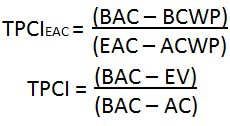The To Complete Performance Index (TCPI) is a comparative Earn Value Management (EVM) metric used primarily to determine if an independent estimate at completion is reasonable. It computes the future required cost efficiency needed to achieve a target Estimate at Completion (EAC).
TCPI Definition: It is a measure of the cost performance that is required to be achieved with the remaining resources in order to meet a specified management goal, expressed as the ratio of the cost to finish the outstanding work to the remaining budget. (PMBOK Guide)
Purpose of To Complete Performance Index (TCPI)
The TCPI helps Program Managers and Earned Value Professionals determine the future efficiency of a project. It tells them how to effectively use their resources to complete the project on budget.
TCPI answers the basic project question: How efficiently must we use our remaining funds?
PMI PMBOK Guide: “TCPI is the calculated Cost Performance Index that is achieved on the remaining work to meet the specified management goal, such as the BAC or the EAC.”
How to Calculate the To Complete Performance Index (TCPI)
The TCPI is computed by dividing the budget remaining, which is represented by subtracting the cumulative Actual Cost Work Performed (ACWP) from the target EAC, into the budgeted cost of work remaining, which is represented by subtracting the cumulative Budgeted Cost Work Performed (BCWP) from the Budget at Completion (BAC). The TCPI is compared to the cumulative Cost Performance Index (CPI) to determine if a target EAC is reasonable.

EVMS Glossary of Terms:
AC = Actual Cost
EV = Earn Value
BAC = Budget at Completion
BCWP = Budgeted Cost Work Performed
EAC = Estimate at Completion
ACWP = Actual Cost Work Performed
The TCPI is:
- Reasonable: if TCPI is within .5 of CPI
- Overly Optimistic: if TCPI is greater than .5 of CPI
- Overly Conservative: if CPI is more than .5 of TCPI
Example Scenario:
The project you are working on is 12 months long and has a budget at Completion of $100,000 months. You are currently at 6 months and spent $60,000 USD, and 60% of the work has been completed.
Question: Calculate the To Complete Performance Index (TCPI) for your project.
- Budget at Completion (BAC) = $100,000
- Actual Cost (AC) = $55,000 USD
- Planned Value (PV) = 50% of $100,000 = $50,000 USD
- Earned Value (EV) = 60% of 100,000 = $60,000
- Cost Performance Index (CPI) = EV / AC = 120,000 / 110,000 = 1.1
Since the Cost Performance Index (CPI) is 1.1, which is greater than one, you are under budget.
Therefore, you will use the TCPI formula based on the BAC in this case.
- TCPI = (BAC – EV) / (BAC – AC)
- = 100,000 – 60,000) / (100,000 – 55,000)
- = 40,000 / 45,000
- = 0.89
Answer: Total Cost Performance Index of 0.89 is ok to complete the project. Since it’s within .5 of the CPI of 1.1: It’s deemed Reasonable.
The Main Difference Between Cost Performance Index (CPI) and To Complete Performance Index (TPCI)
Cost Performance Index (CPI) and TCPI both are a measurement of a programs cost efficiency but CPI is current and TCPI is future/forecast. The main differences between CPI & TCPI are:
- CPI represents the project’s current cost-efficiency
- TCPI estimates the project’s future cost-efficiency
- CPI is the actual efficiency of the completed work
- TCPI is the estimated forecast of efficiency of the remaining work
- There are 2 different TCPI Formulas vs. 1 CPI Formula
AcqTips:
- TCPI is a new term that recently appeared in the new Project Management Institute’s (PMI) Project Management Body of Knowledge (PMBOK) 4th Edition.
AcqLinks and References:
- DAU EVM Gold Card – 2020
- DOE EVMS Gold Card – 2019
- Website: Program Management Institute (PMI): Total Cost Performance Index
Updated: 4/21/2021
Rank: G2.2
